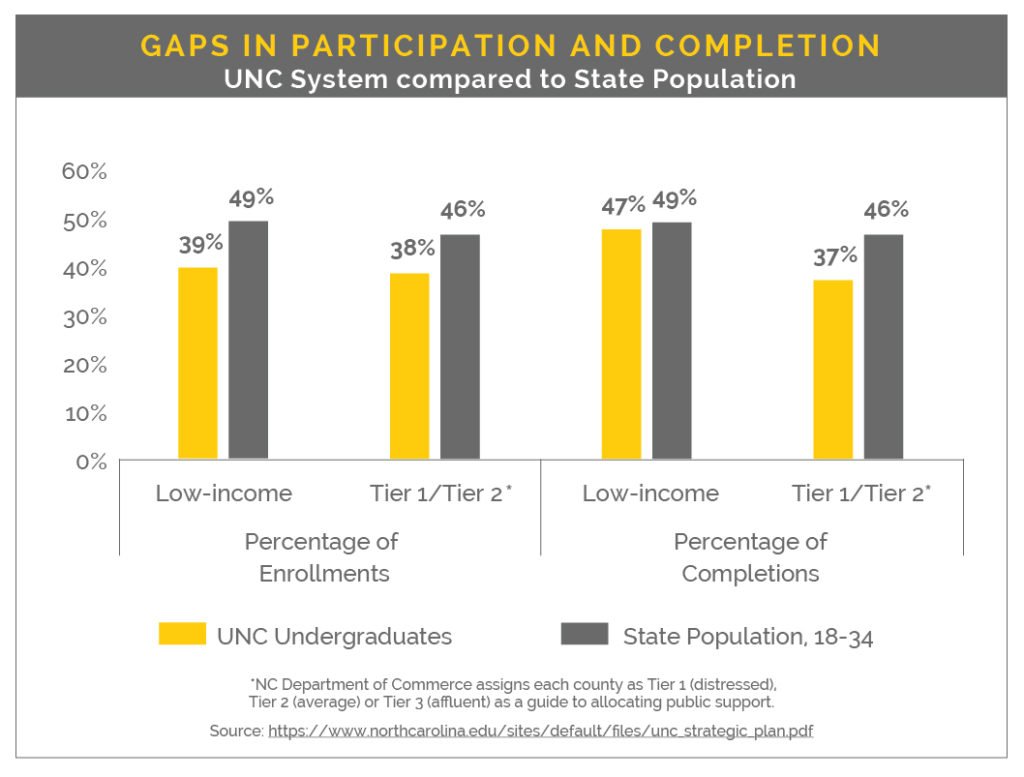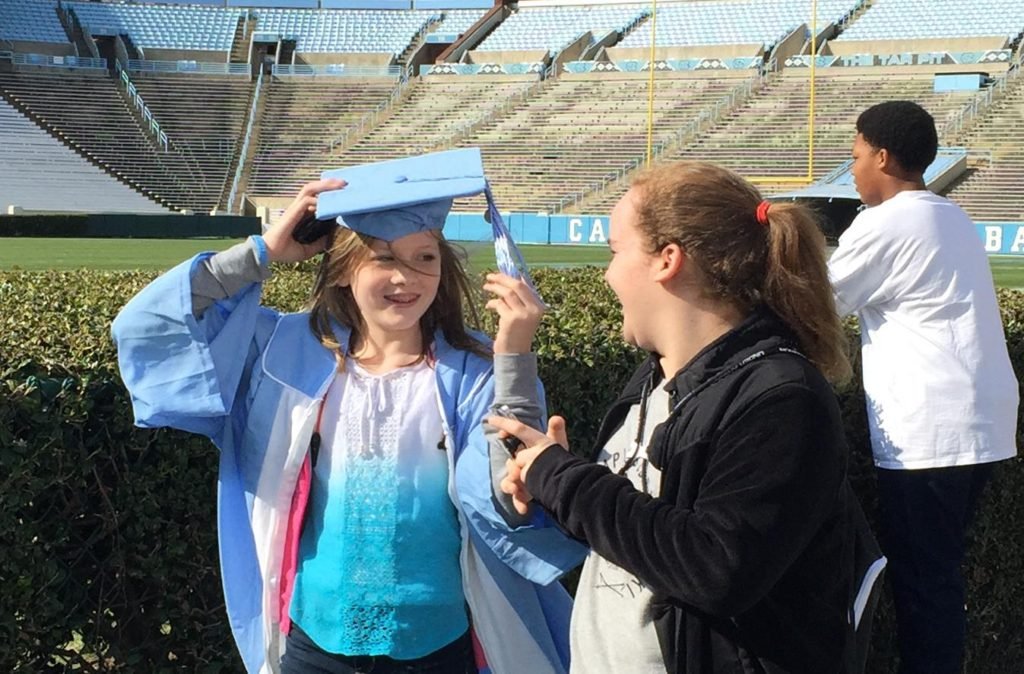CHAPEL HILL – Thinking about college doesn’t start when you’re a senior in high school. It starts in middle school, if not sooner.
Or – especially if no one in your family has been to college – sometimes not at all.
Part of the reason UNC Chapel Hill won the $1 million Cooke Prize for promoting access to higher education is First Look, a program that welcomes middle-school students to campus to demystify college. First Look tries to help first-generation students from the state’s poorest counties see themselves on a college campus.
“Our goal is for these kids to be able to picture themselves in college,” says Missy Julian-Fox, director of the UNC Visitors’ Center and First Look.
“We want these kids to go home with the belief that college is a real possibility,” she said. “This is about access and opportunity, but we have to create a pipeline to our University for our middle-school students to give them the knowledge and time to develop the necessary grades, scores, skills and mindset.”
The youngsters get to walk around campus, eat in a dining hall, visit Kenan Stadium, rub shoulders with college students and ask questions.
“If you feel like you belong, you give yourself permission to imagine, to evaluate and hear the information,” Julian-Fox says. “And if you don’t feel like you belong … you’ve cut yourself off. We’ve been trying to address that since the very beginning.”
The UNC System wants to address it as well. The system’s new strategic plan calls for all 17 UNC campuses to increase enrollment among low-income and rural students.

FIRST LOOK has been at it since 2008, when it began with a visit from a class of 5th-graders from Person County. It welcomed 6,000 students last year and has hosted visits from 62 NC counties.
“The phone has never stopped ringing,” Julian-Fox says, as teachers search for ways to introduce their students to college.
The students typically arrive in groups of 100 that meet first as a group for 20-30 minutes.
“Why are you here today?” they’re asked. “Because we believe you belong in college.”
They hear three powerful statistics:
• 65% of jobs in the U.S., or almost 2/3, will require college by 2020.
• Over a lifetime, college graduates earn $1 million more than those without a college degree.
• College graduates are less likely to face unemployment.
They hear about financial aid, including Pell Grants, the Carolina Covenant and other scholarships. “Do not let the price tag stop you from going – there are ways to pay,” Julian-Fox says.
They then break into groups of 10 to 12 to tour campus with a Carolina student guide – a “near-peer” who is often a student from a similar rural or low-income background. They discuss ways that college connects with students: academics, art, sports, campus life, student living, study abroad.
With their First Look Guide, middle school students look at a college campus through the lens of their own experience, comparing and contrasting what it would be like as a college student.
They eat in a dining hall with college students. They visit a lecture hall, a makerspace with 3D printers, and landmarks such as the Old Well, Old East and South Building. They learn the chancellor is like the principal at their school.
AT KENAN STADIUM, the guide pulls out a cap and gown and lets the kids try it on, then asks one to continue wearing the graduation garb.
They then proceed to a theater-in-the-round classroom, where the Department of Psychology and Neuroscience performs engaging experiments.
“It’s a peek inside a college classroom,” Julian-Fox says.
Then the students who are still wearing caps and gowns go through a mock graduation – complete with “Pomp and Circumstance” and spontaneous applause.
“This could be you!”
The tour promotes college life in general – it doesn’t try to tell kids they must come to Chapel Hill. “I don’t know if this is going to be the best fit for them,” Julian-Fox says.
“No matter what college you choose, your graduation will mark a momentous occasion,” the students are told as they look at graduation photos. “You can find the college that fits you best…. Where will you take your graduation photo?”
“Everything we’re doing is trying to connect their middle-school experience to a possible future in college,” Julian-Fox says.
Because 8th-grade performance is a strong predictor of college completion, “If you’re in 8th grade, we’re looking at you and saying, ‘You can decide today that you’re going to be that student.”
JULIAN-FOX still recalls that first visit by the class from Person County.
At the end, one little girl asked: “I’m in fifth grade. What can I do if I decide I want to go to college?”
“She was all in,” Julian-Fox says. “We all had tears in our eyes.”
A Covenant Scholar answered the girl’s question.
“You need to be your best self,” she said. “You need to tell yourself, ‘I can do this and I’m going to go to college … and I’m going to ask for help when I need it.”
FIRST LOOK has to turn away 2,000 to 5,000 would-be student visitors a year, Julian-Fox says, because her office doesn’t have the capacity to serve every school that wants to come. The program is developing a very realistic virtual-reality app to share with those who can’t come walk the actual brick walkways.
Julian-Fox envisions a program like First Look at every college campus. “First Look is a model that transfers to any campus in America,” she says.


Leave a Reply